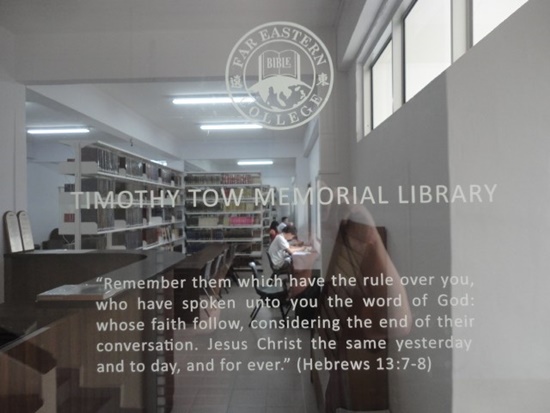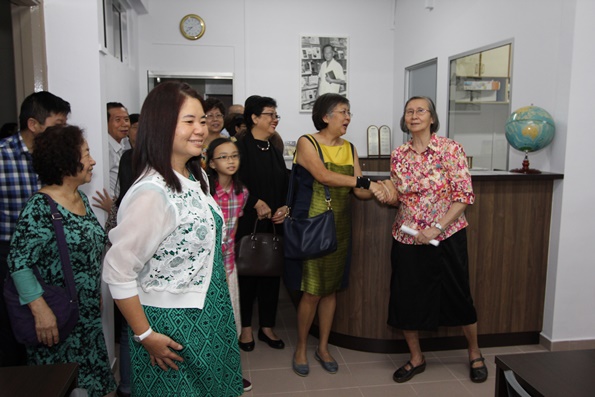TIMOTHY TOW MEMORIAL LIBRARY THANKSGIVING & DEDICATION SERVICE

We thank the Lord for a blessed evening of thanksgiving and fellowship when about 300 came to worship the Lord and remember the Rev Dr Timothy Tow’s pastoral ministry as the founding pastor of Life and True Life Bible-Presbyterian Church and his teaching ministry as founding principal of Far Eastern Bible College. It was a founder’s day of sorts.
The event was held right after the FEBC exams on Friday, November 13, 2015. It began with a thanksgiving dinner (buffet) at six. The dedication service started at 7.15 pm. Thank God for the cool weather brought about by the showers earlier in the day.
At the dedication service, Academic Dean Quek Suan Yew preached on the topic “Remembering Our Teachers”: “Remember them which have the rule over you, who have spoken unto you the word of God: whose faith follow, considering the end of their conversation. Jesus Christ the same yesterday, and to day, and for ever.” (Heb 13:7-8). He shared how Rev Tow’s teaching and example had influenced his life and ministry.
It ought to be underscored that the new library is named after the founding principal not to glorify the man but to remember him. It is to serve a pedagogical purpose. It is our hope that future students would enquire about the man God had used to found and build FEBC, ask about his doctrine and convictions and still learn from him through his books.
Mrs Ivy Tow, wife of Timothy Tow and matron of FEBC, officially opened the new library by cutting the ribbon. An open house followed. Visitors were given a guided tour of the premises on both sides of Gilstead Road by our students. Former Lifers (now True Lifers) who had given to Beulah House were looking forward to seeing the newly built and restored premises for the first time. All visitors to the FEBC Bookroom now located at Beulah House received a free hardcover copy of Rev Tow’s book—The Law of Moses and of Jesus.
We regret we were unable to sit more people in the FEBC Hall which has a maximum capacity of 180. (We had asked for the church sanctuary but it was unavailable as it was being prepared for a wedding the next day.) To cater for the spill over, a projector and screen had to be set up at the badminton court outside the FEBC Hall under the wedding tent. We thank the wedding couple for kindly accommodating us.
We thank the Lord for all well-wishers. Elder Tan Cheow Hock of Life BPC personally gave a love gift to the Timothy Tow Memorial Library. The Lord bless him. The Lord also bless the anonymous giver who presented a tall bouquet of flowers to brighten the event, and all who had in one way or other contributed to the ministry of the college. JK
CHARISMATIC TONGUES EXAMINED (I)
“Yet in the church I had rather speak five words with my understanding, that by my voice I might teach others also, than ten thousand words in an unknown tongue” (1 Cor 14:19).
The Charismatic Movement has popularised tongue-speaking in many churches. Some claim that tongue-speaking has brought revival to the church, while others observe that it has caused confusion instead. Should Christians speak in tongues today? What does the Bible teach concerning tongues?
A Supernatural Gift of the Holy Spirit
The Holy Spirit is the One who enables a person to speak in tongues (1 Cor 12:4, 8-10). It is He who decides which gift or gifts a Christian should have (1 Cor 12:11). If it is not the will of the Holy Spirit that a person should have the gift of tongues, he will not have it even if he seeks it through much prayer and fasting. Paul has made it very clear that not everyone will have the same gifts: “Are all apostles? are all prophets? are all teachers? are all workers of miracles? Have all the gifts of healing? do all speak with tongues? do all interpret?” (1 Cor 12-29-30). These rhetorical questions expect the answer, “No.” Not everyone will have the gift of tongues, and be able to speak in tongues.
It is also important to note that when the gift of tongues is given to an individual, the Holy Spirit supernaturally enables him to speak in tongues. One does not need to go through any speech training in order to exercise the gift. Tongue-speaking is not letting one’s tongue “roll” in super-quick hallelujahs till one gibbers. Such self-induced and self-taught tongues are not biblical tongues. The ability to speak in tongues is God-given, not man-made!
Foreign Languages or Ecstatic Utterances?
The first instance of tongue-speaking was at Pentecost when the Holy Spirit filled the disciples of Christ, and they began to speak “with other tongues, as the Spirit gave them utterance” (Acts 2:4). The Greek word glossai (tongues) means “languages.” The Apostles at Pentecost were supernaturally empowered to speak in foreign languages they had not previously learned. This is proven by the fact that when they spoke in tongues, the people were amazed because “every man heard them speak in his own language (literally, “dialect”),” and questioned among themselves, “Behold, are not all these which speak Galileans? And how hear we every man in our own tongue (dialect), wherein we were born?” (Acts 2:6, 8). Who were these people who heard the Apostles speak? They were “Parthians, and Medes, and Elamites, and the dwellers in Mesopotamia, and in Judea, and Cappadocia, in Pontus, and Asia, Phrygia, and Pamphylia, in Egypt, and in the parts of Libya about Cyrene, and strangers of Rome, Jews and proselytes, Cretes and Arabians, we do hear them speak in our tongues (languages) the wonderful works of God” (Acts 2:9-11). Luke the inspired historian would have us know that when the Apostles spoke in tongues, they spoke in foreign languages or ethnic dialects. Tongue-speaking is not ecstatic speech or gibberish. The gift of tongues is the gift of languages.
It is readily admitted by many modern tongue-speakers that the tongues they speak are not human (i.e. foreign languages) but angelic tongues (i.e. ecstatic utterances, cf. 1 Cor 13:1). As far as we know from Scripture, whenever the angels spoke, they did so in human languages, namely, Hebrew, Aramaic, or Greek. In any case, it ought to be understood that Paul was using hyperbolic speech here. A hyperbole is an intended exaggeration to drive home a desired point. Paul was not saying that he is able to speak in angelic tongues (or that there is such a thing as tongues of angels), or understand all mysteries, have all knowledge, or move mountains. He is saying that even if he can do all those things, but does not have love, he is a big zero. To understand 1 Cor 13:1-2 other than this is to miss Paul’s point.
The confusion over tongue-speaking is not new. Paul found absolute confusion over the use of spiritual gifts in the church at Corinth (1 Cor 12-14). The gift of tongues was abused by the Christians there. Every member in church wanted to speak in tongues. Obviously, some did not have the gift, but pretended to have it by speaking ecstatically.
It needs to be clarified that the “unknown tongue” (so KJV) Paul speaks of is not ecstatic speech but foreign language (1 Cor 14:2). It is “unknown” in the sense that the gifted man is able to speak in a foreign language he has never learned or heard before, and that it is unintelligible to the hearer who does not know the language spoken. In ordinary circumstances, when a person speaks in tongues in his own native church, no man understands; only God understands since He understands all languages (1 Cor 14:2). Thus the one who speaks in tongues edifies only himself since without an interpreter or translator, he is the only one who understands what he is saying (1 Cor 14:4). Paul emphasized the importance of understanding; “Yet in the church I had rather speak five words with my understanding, that by my voice I might teach others also, than ten thousand words in an unknown tongue” (1 Cor 14:19).
The central idea Paul was trying to get across was that edification (1 Cor 14:3, 4, 5, 12, 17, 26) comes by way of understanding (1 Cor 14:2, 7, 9, 14, 15, 16, 19). Paul said that prophesying is superior to tongue-speaking. The gift of prophecy is the gift of being able to foretell and forthtell the will and word of God. When the prophet speaks, he speaks to his own people in their own native tongue. The members of the church benefit from the words spoken because they are able to understand the message given.
The Apostle makes this very clear by using the illustration of music (1 Cor 14:7-8). Music is music only when there is a tune or a melody. How does one expect to appreciate music when the pianist plays only one note throughout, or a random string of notes that does not make up a tune? So unless one speaks in a language that others can understand, one is wasting one’s breath (1 Cor 14:9). A language has grammatical forms and syntactical structures comprising of nouns, verbs, conjunctions, prepositions, adjectives etc. As Paul said, “There are, … so many kinds of voices in the world, and none of them is without signification” (1 Cor 14:10). When a person prays in tongues, he prays with his heart as well as with his mind (1 Cor 14:15). In other words, he knows what he is saying and can identify the language he is speaking. A genuine tongue-speaker will be able to analyse the language he has spoken by identifying the different words he has used, and their respective meanings. The Holy Spirit is perfect. The gifts that come from Him are perfect. The gifted tongue-speaker when given the supernatural ability to speak in a foreign language will be perfectly proficient in that language he is enabled to speak. He will be able to write out the content of his speech, list the vocabulary, and demonstrate the grammatical-syntactical relationship of the words. Are modern-day tongue-speakers able to do this? JK

Visitors touring the Timothy Tow Memorial Library after the ribbon cutting by Matron Ivy Tow


